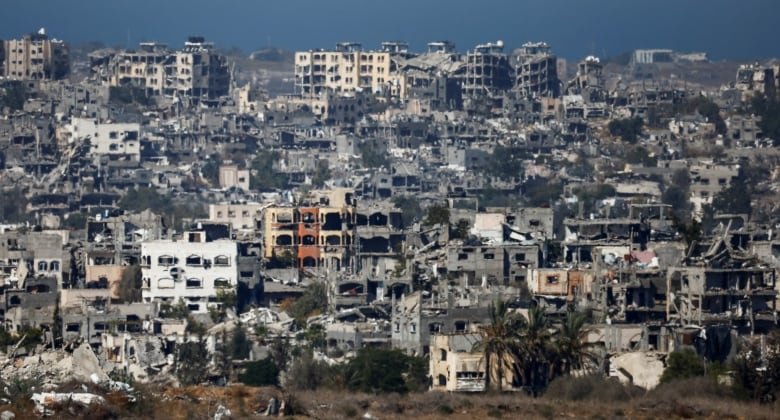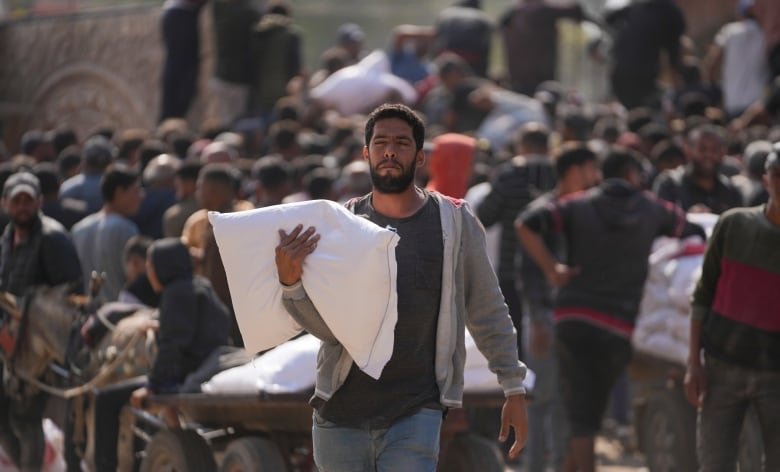An Israeli airstrike killed seven people late Monday at a café near the southern Gaza city of Khan Younis, Palestinian medics said, bringing the death toll from Israeli strikes since Sunday night to at least 37.
In central Gaza, Israeli forces earlier on Monday sent tanks into the Nuseirat camp from the west, sparking panic among residents and displaced families as advancing tanks opened fire.
Twenty people were killed by air and ground strikes in Nuseirat, one of the Gaza Strip’s eight historic refugee sites, overnight and into Monday, including some in a tent encampment, health officials at Al-Awda Hospital in Nuseirat said.
One resident, Zaik Mohammad, said the tanks’ advance was a complete surprise.
“Some people couldn’t leave and remained trapped inside their homes, appealing to be allowed out, while others rushed out with whatever they could carry as they fled,” Mohammad, 25, who lives one kilometre away from the targeted area, told Reuters via a chat app.
There was no Israeli comment on Monday’s violence.
With the war in Gaza now in its 14th month, Israel is focusing its operations in the north and centre in what it says is a campaign to stop Hamas militants waging attacks and to prevent them from regrouping.

Tens of thousands of Palestinian residents have been told to evacuate the areas, fuelling fears that they may never be allowed to return.
The already slim chances of a ceasefire in Gaza receded further at the weekend when mediator Qatar said it was suspending its efforts until both Israel and Hamas showed greater willingness to reach an agreement.
Israeli airstrikes also killed people in Gaza City and in the northern Gaza town of Beit Lahiya, where Israeli forces have operated since Oct. 5, medics said.
At Kamal Adwan Hospital near Beit Lahiya, medics said Israeli fire from a drone wounded three medical workers in the facility.

The Israeli military said it killed a senior commander of the Islamic Jihad group, an ally of Hamas, Mohammad Abu Skhail, in a strike on Saturday at a command centre inside a compound that previously served as a school in Gaza City. Palestinian medics said the attack killed six people.
As Palestinians live in fear of airstrikes and ground attacks, they’re also battling hunger daily. Global food security experts say there is a “strong likelihood” that famine is imminent in parts of northern Gaza as the conflict rages on.
Itimad al-Qanou, a Palestinian mother struggling to feed her seven children, told Reuters she sometimes feels like death is the only option left to her family.
“No one is looking at us, no one cares about us. I ask the Arab countries to stand with us, at least to open the borders so food and supplies can reach our children,” she said.
“They are all liars; they are lying to the people. The United States is standing with Israel against us, they are all united against us.”
Hospitals under siege
Israeli forces have besieged the three hospitals in and around Jabalia for several weeks and hospital officials have refused orders to evacuate the facilities or leave their patients unattended, despite the lack of food or medical and fuel supplies.
The Israeli military has repeatedly targeted health-care facilities, despite their protected status during wartime, throughout its campaign in Gaza. It accuses Hamas of exploiting Gaza’s civilian population for military purposes, a charge the militant group denies.
A CBC freelance journalist in the Gaza Strip captured the scene at Nasr Hospital in Khan Younis on Thursday, after hospital officials said a child and his father were killed and other family members were injured in an airstrike in the Sheikh Nasser area. Sobhia Omran, a relative, said the house was hit in the middle of the night while the family was sleeping.
The army sent tanks into Beit Lahiya, Beit Hanoun, and Jabalia camp in northern Gaza over a month ago. It said it had killed hundreds of militants in Jabalia and around it since the raids began. The armed wings of Hamas and the Islamic Jihad said their fighters have killed many Israeli soldiers in recent weeks.
On Monday, the Israeli military said it had expanded the “humanitarian zone” in the enclave. It also said it would allow more tents, shelter materials, food, water and medical supplies to enter. But Palestinian and United Nations officials say there are no safe areas in the enclave, home to more than 2.1 million people and now largely in ruins.
Deadline for Israel to increase aid looming
This week, the U.S. will be assessing whether Israel has sufficiently improved its delivery of aid in Gaza under the threat of a scaling back of American military support.
Israel said on Monday it had met most demands by the United States to improve humanitarian conditions in Gaza but was still discussing some items as a deadline looms.
There are a number of things that remain under discussion and they touch on safety issues, an Israeli official told reporters. He said most issues had been addressed.
The U.S. government said in an Oct. 13 letter that Israel had 30 days to take specific steps to address the humanitarian crisis in Gaza, where Israel’s military assault in the last 13 months has displaced nearly the entire population, caused a hunger crisis and led to allegations of genocide at the World Court, which Israel denies.
In October, the amount of aid entering the enclave dropped to its lowest level since the first month of the war, with 57 trucks entering each day, according to Israeli figures, compared to the 350 that the U.S. has called for.

The war erupted on Oct. 7, 2023, when Hamas-led gunmen attacked Israeli communities, killing around 1,200 people and seizing another 253 hostages, by Israeli tallies. Israel’s brutal military campaign has levelled much of Gaza and killed around 43,500 Palestinians, Gaza health officials say.
The conflict has also ignited hostilities between Israel and Lebanon, with Israel going on the offensive in September and pounding wide areas of Lebanon with airstrikes it says are aimed at the militant group Hezbollah. In the past year, Israeli attacks have killed more than 3,000 people in Lebanon and displaced a million, while Hezbollah attacks have killed roughly 100 people in northern Israel.
Israel said on Monday that there was progress in talks about a ceasefire at the Lebanese-Israeli border, indicating that Russia could be tapped to stop Hezbollah from rearming via Syria. The Iran-backed group said it had not received any new truce proposals.



